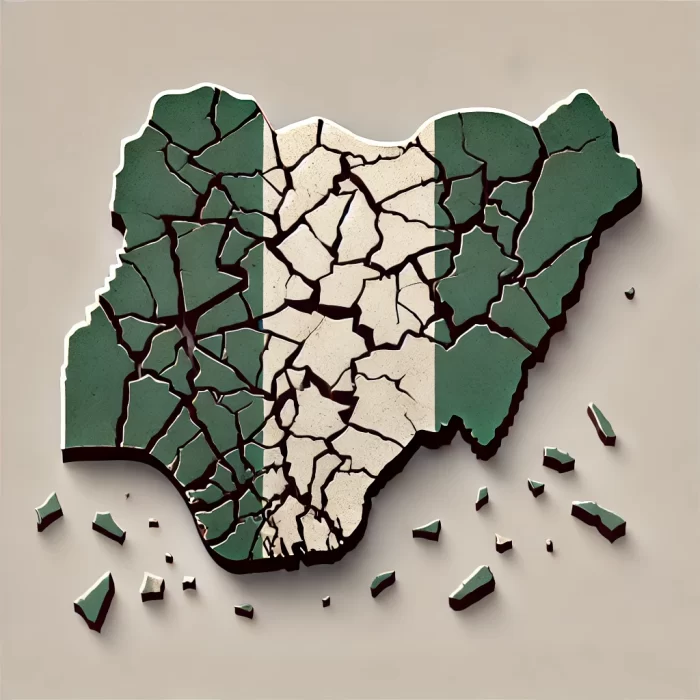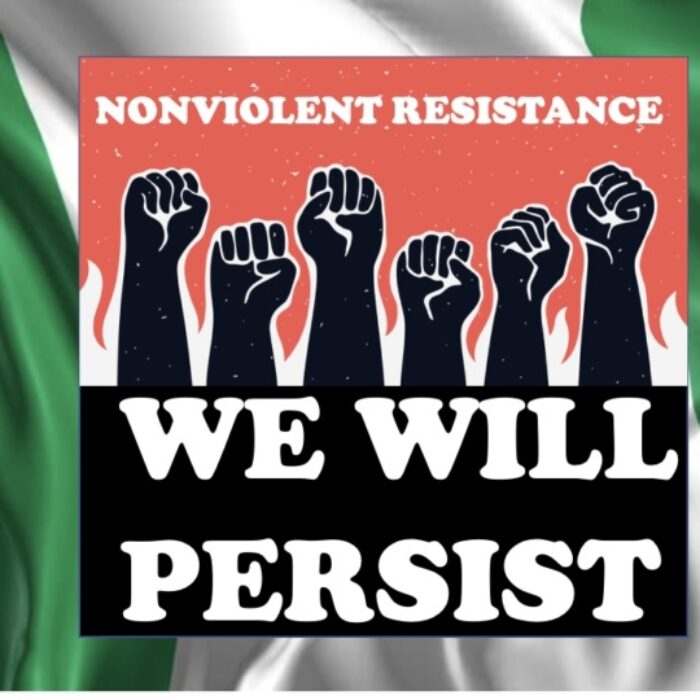By The Editorial Board
The horrors of the first nine months of President Tinubu’s administration mark the start of a tragic period for Nigeria, as the country teeters on the brink of collapse and chaos.
This period has unfortunately set the stage for what could be a deepening crisis, as the nation grapples with the prospect of further instability and societal turmoil.
What concerns me, and should alarm the nation as well, is how President Tinubu is sowing the insidious seeds of authoritarianism, posing a clear and present danger to the country.
Within nine months, Tinubu has centralized unprecedented levels of power around his presidency, unparalleled in the nation’s history. He has compromised the independence of the National Assembly and the judiciary.
Also, he has created a perilous cult of personality around himself, demanding the public and members of the National Assembly to pledge allegiance to his administration and, by extension, to him personally.
Moreover, he has co-opted key business, political, cultural and religious elites, procuring their blind loyalty.
Additionally, he now owns the APC and has single-handedly advanced the party’s ideological goals of achieving electoral dominance and ensuring APC’s supremacy with unmatched determination and ruthless efficiency.
In effect, Tinubu has incapacitated the National Assembly and neutralized the judiciary, rendering them oblivious to his actions as he methodically weakens the constitutional checks and balances, allowing him to act at his discretion with impunity.
As I understand it, the aim of the constitutional balance of power, a principle foundational to our democratic system, is to prevent any one branch of government (executive, legislative, judiciary) from gaining excessive power and to ensure a system of checks and balances.
Under Tinubu, this balance of power has been purposefully corrupted and severely undermined.
The APC majority, placing party and personal interests above the nation’s well-being, has sworn unwavering loyalty to Mr. Tinubu, their “Dear Leader”, and is prepared to follow his directives, no matter the consequences to Nigerians.
The judiciary, reliant on the ruling party for funding and appointments, has forfeited its autonomy, becoming deeply politicized and compromised. Consequently, it has become a toothless lap dog for the administration and the ruling party, incapable of impartially resolving political disputes without external influence.
Tinubu’s suppression of the legislative and judicial branches, coupled with his co-optation of the business, political, cultural and religious elites, has laid the foundation for him to reconstruct Nigeria according to his singular vision.
This perilous setting permits him to operate unchecked against those who dissent, crush any opposition, and weaken the systems of checks and balances that are crucial for the protection of citizens’ rights and freedoms.
Given Tinubu’s public skepticism about national unity (“I don’t believe in one Nigeria”, ThisDay, 1997) and his assertion of divine entitlement to the presidency (“It is my turn”), his ambition seems predestined.
The urgency to halt this imminent tragedy is paramount.
Without checks from the legislature and judiciary, Tinubu could enact laws, policies, and actions without oversight, including restructuring the nation in his own image (this later).
Absolute power under Tinubu with all checks on his authority neutralized will lead to potential abuses of power and corruption and ultimately the collapse of the nation’s democratic system.
Many Players Share Responsibility in the Approaching Crisis
To describe President Tinubu’s tenure as a train wreck would be an understatement. But this is no accident. Tinubu is not the sole architect; many other players bear responsibility in this looming tragedy.
To suppress dissent, a compliant police force is being deployed by Tinubu to threaten peaceful demonstrators.
Some business elites, politically privileged, and aiming to safeguard their illegitimate wealth, use their financial resources to support Tinubu and maintain the status quo.
The INEC, heavily influenced by the ruling APC, willing and able to do its bidding, allegedly engages in election rigging, showing no respect for democratic principles of fair and free elections.
Several influential religious figures, driven by ethnic solidarity and financial incentives, continue to depict Tinubu as the much-anticipated savior. They compel their adherents to support him without question, using the threat of eternal damnation as leverage.
But their messianic promises of divine deliverance and provision of manna from heaven to feed starving children have fallen short in the wake of Tinubu’s policy failures. As children continue to suffer and die from starvation, the anticipated divine intervention remains absent, despite fervent prayers for solutions requested by some of these “men of God.”
At the same time, the leading opposition parties – the PDP, LP, and NNPP – have become politically neutered, irrelevant, sidelined and incapable of overcoming their leadership hubris and ideological rifts for the national interest.
Apart from sporadic social media updates and tame press interviews, Messrs. Atiku Abubakar, Peter Obi, and Rabiu Kwankwaso seem to have relinquished the dynamism, energy, and freshness that once attracted over 14.6 million (more than 60% of total votes cast) of the Nigerian electorate who supported them in the 2023 presidential elections.
Sadly, the Labour Party (LP), which once mobilized and energized the youth to become politically active, is disintegrating, breaking into factions as if it were a vase smashed into pieces, where each shard represents a distinct aspect of what was once a unified entity but now finds itself unable to reunite into a single whole.
Under Mr. Obi, the fragmentation of the LP has been paradoxically driven by a leadership vacuum, internal conflicts, and charges of corruption and embezzlement.
Meanwhile, a disillusioned citizenry, torn by tribal, regional, partisan and religious divisions, remain submissive and passive, influenced by biases and political manipulation, failing to unite and rally for their own salvation.
Shift Towards Authoritarianism
Put together, there are growing concerns about the absence of a strong opposition and Tinubu’s approach to governance, with patriotic Nigerians fearing a shift towards authoritarianism. Everywhere you look, warning signs of despotism are flashing red.
This concern is particularly acute in relation to freedom of speech, with proposed measures by Tinubu and championed by his Chief of Staff, Femi Gbajabiamila, to regulate social media and suppress dissent, contrary to the guarantees enshrined in Section 39 of the amended Constitution of the Federal Republic of Nigeria.
Another sign that Tinubu is becoming despotic reveals in his total lack of compassion. In his thirst for absolute power, like all despots before him, he is indifferent to the hardships people are going through from the slums of Aba to the ghettos of Zaria.
He has overlooked the pleas of some traditional rulers and religious leaders for empathy and human-centered policies. When he offers palliatives, they are too little, too late, and of no significance. He is uncaring.
Furthermore, without prior consultation and before officially unveiling his restructuring agenda, Tinubu is tactically employing executive orders to relocate key government entities to Lagos.
According to administration officials who spoke on the condition of anonymity for this article, these entities include the Central Bank of Nigeria (CBN), the Federal Airports Authority, and eventually the Federal Ministry of Finance, Ministry of Industry, Trade and Investment, Federal Ministry of Innovation, Science and Technology, and Federal Ministry of Marine and Blue Economy.
Despite claims of cost efficiency, insiders believe his true motive to relocate this vital institutions is to enhance the Southwest’s negotiating power in anticipation of his restructuring program, strengthen its economic and administrative framework, and ensure the region is well-positioned for autonomous success.
In sum, the emerging pattern suggests a slide towards dictatorship, with a self-centered leader, an acquiescent National Assembly, a submissive judiciary, divided society, including silent academics, compliant business elites, and some corrupt religious and cultural figures.
This sets the stage for unchecked presidential power, raising questions about the extent of authoritarian control that might unfold in the remaining 3 years of the Tinubu presidency.
Abuse of Centralized Power
This excessive centralization of authority and influence has emboldened Mr. Tinubu to enact hasty and reckless policies unilaterally. These actions, made without seeking advice or consensus, have worsened an already challenging situation.
The harmful effects of Tinubu’s policy blunders are many. These include the unilateral and abrupt removal of fuel subsidies without a plan to counteract adverse consequences. His ill-advised devaluation of the Naira amid dwindling foreign currency reserves and reliance on imports for food and necessities.
Additionally, he enforced aggressive restrictions on vital remittance transactions through Bureau de Change operators, leading to reduced payouts that are critical for the livelihood of millions of Nigerians.
On Tinubu’s directive, the Central Bank of Nigeria (CBN) recently made another desperate decision to raise interest rates, overlooking the underlying structural factors driving inflation.
This ill-considered move is unlikely to curb inflation and is expected to exacerbate the dire situation facing Nigerians by allowing businesses to justify price increases under the pretext of higher borrowing costs.
Instead of reducing inflation, it is likely to continue increasing it, while unemployment could rise from its already extreme levels. The economy, shocked and struggling under these conditions, may face a severe depression in the coming months, mirroring the crisis experienced by Venezuela and Argentina.
Furthermore, Tinubu’s failure to empathize with or provide sufficient support to those suffering from his policy errors, highlights his unpreparedness for the office. These governance malpractices should serve as a warning of what might come next.
Tampering with interest rates and remittances as makeshift fixes for high inflation and the Naira’s devaluation misses the point. The real issues stem from the administration’s inability to stimulate economic growth and reduce national debt and government spending.
Furthermore, the misuse of the Central Bank as a piggy bank for the administration, failure to boost domestic revenue, inability to fight corruption, and reluctance to cut unnecessary government costs are root causes.
Nigerians Are Starving to Death
The consequences of Tinubu’s current policy disasters are profoundly tragic, plunging the nation into widespread hunger, instability, extensive homelessness, critical health emergencies, and starvation-induced fatalities, as the president fumbles through his policy missteps without a coherent strategy.
People are perishing from a human-induced disaster: hunger. The most vulnerable—infants, the elderly, and the ill—are the first to succumb. The burden of hardship falls most heavily on the poor.
Lately, the escalating desperation of starving crowds has transformed the few food distribution points into deadly battlegrounds, where survival hinges on obtaining basic necessities like bread or rice at any cost. Nigerians have been forced to consume grains intended for livestock.
In the midst of these horrendous suffering, Tinubu’s suggestion for Nigerians to stop complaining and pray for their daily bread strikes a tone of remarkable insensitivity and disconnect from the grim reality many fellow Nigerians are facing.
The sentiment among Nigerians that they fared better during the difficult years under Mr. Buhari than they currently do under Tinubu highlights the significant decline the nation has experienced in just nine months. Yet, the outlook remains grim; further difficulties lie ahead.
Sources within the administration, requesting anonymity, disclose upcoming economic policy prescriptions, and distress, in the next few months.
These include plans to cut various remaining subsidies, such as those for electricity, agriculture, education, healthcare, and industrial support, affecting everything from utility costs to school fees, medical expenses, and business growth incentives. These cuts, often mandated by external creditors, will lead to increased expenses for already struggling Nigerians.
The current situation is exacerbated by reported internal conflicts within the administration pitting Tinubu’s inner circle of yes-men against other members of the government, leading to the implementation of inconsistent and thoughtless policies, worsening the economic situation and making living conditions for citizens awful.
All this paints a picture of a presidency overwhelmed by incompetence and blinded by arrogance, led by a visionless president unsure of the next steps, supported by a compliant National Assembly, amidst a nation in search of its identity and a public resigned to despair, unlikely to witness progress under Tinubu’s abysmal leadership.
Blaming Ex-President Buhari is Futile
I recognize that the challenges we face as a nation did not start with President Tinubu. He took over an economy that was already in distress. Yet, as president, he has become responsible for both the problems and their solutions. The administration’s recent attempt to shift blame to Buhari is futile. Faulting Buhari offers no solution.
Tinubu was well aware, even before his candidacy, that his party’s actions under Buhari had led the nation astray. He campaigned on promises to change course and halt the nation’s decline, touting his competence and business acumen as the solution to the nation’s myriad problems.
Recognizing that nine months is a brief period to assess a four-year presidential term, it’s crucial to note that a president’s effectiveness is less about time served and more about the personality traits they bring to office.
These traits are proven predictors of a president’s long-term performance in office, including vision, intelligence, conscientiousness, empathy, openness, moral integrity, and competence to do the job and solve the peoples’ problems. Unfortunately, Tinubu’s indicators in these areas are lacking.
This deficiency is evident in the hardships millions of Nigerians face, including unemployment, the soaring costs of basic necessities, and widespread destitution.
Given President Tinubu’s unlikely change in inherent traits, I foresee no shift in his policy direction, predicting that the current grim conditions will only deteriorate. Regrettably, it is with profound sadness that I predict a future marked by more policy failures, heightened hardship, and further fatalities.
According to sources inside the administration who spoke on conditions of anonymity to avoid reprisal, Tinubu’s policy decisions are clouded by his own arrogance and an overwhelming sense of self-importance, driven by a desire to gain legitimacy from the international community, which sees him as a flawed leader.
In his quest for a lasting legacy, he appears willing to ignore the severe impact of his decisions—or indecisions—on the lives of millions of impoverished and hungry Nigerians, particularly women and children. The well-being of the citizens, it appears, is of little concern.
We Can Stop The Imminent Tragedy
However, this grim situation is not inevitable. Nigerians, transcending their divisions, must unite to reclaim their nation. Although the path toward tragedy has begun, it is both preventable and necessary to avert.
The consequences of allowing the Tinubu crisis to persist are too severe, sparing no community, creed, tribe, region, political affiliation, or social class from the ensuing chaos. The urgency to act against this looming disaster cannot be overstated—the unity and collective effort of Nigerians can forge a different, hopeful future.
Yes, we do care, and we must. It’s our duty to work towards a nation that’s more united, stable, safe, and prosperous, aiming for a brighter future not just for our children and grandchildren, but for all generations to come. This responsibility is a debt we’re committed to repaying and prepared to dedicate our greatest efforts to achieve.
I call all Nigerians to wake up and fiercely resist the move towards authoritarianism and fight to protect our young democratic values and our God given rights of human dignity and freedom.





